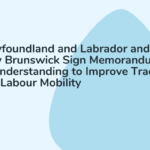As a result of historic demand and limited spaces provided by the Federal Government, provincial immigration capacity is nearly full for 2024.
The Department of Immigration, Population Growth and Skills will be prioritizing the processing of applications in sectors facing labour shortages, such as health care, early learning and construction, for the remainder of the year, leading to slower processing times for other applications. Applications will continue to be processed for individuals with extenuating circumstances.
Applications continue to be accepted under both the Newfoundland and Labrador Provincial Nominee Program and the Atlantic Immigration Program. Applications not processed in 2024 will be processed in the next calendar year. Clients are advised that the 25-day processing standard for the Provincial Nominee Program will resume in January 2025.
This demand for immigration was forecasted and the Provincial Government requested a 15 per cent increase in its spaces for 2024 through the National Immigration Levels Planning consultation process in 2022 and in 2023. Unfortunately, the Government of Canada did not grant this allocation increase.
What This Means for Employers
Employers who have endorsed candidates through the Atlantic Immigration Program should expect those applications to be granted a final decision in 2025, once new federally issued immigration spaces become available. Immigration Program Development Officers will continue to process files and may reach out for further documentation as required.
Applications for Job Vacancy Assessments under the Newfoundland and Labrador Provincial Nominee Program, or Designations under the Atlantic Immigration Program, are unaffected by this decision and will be processed without undue delay.
Employers with any questions or concerns should contact attraction@gov.nl.ca to be connected directly with an Immigration Program Development Officer.
What This Means for Current and Prospective Newcomers
Atlantic Immigration Program applicants can expect to receive a decision on their file after January 1, 2025. While the process unfolds, applicants may continue to hear from their employer about additional documentation needed to complete the application.
Those applying through the Newfoundland and Labrador Provincial Nominee Program may hear from an assigned Immigration Program Development Officer about the file, including any missing or additional documentation.
Newcomers are responsible for informing the Department of Immigration, Population Growth and Skills if they have an expiring work permit or other extenuating circumstance. Concerns and questions can be sent to pnp@gov.nl.ca.
Quick Facts
- In 2023, the Federal Government issued 3,050 immigration spaces for Newfoundland and Labrador. Of these, 2,100 are allocated to the Provincial Nominee Program and 950 to the Atlantic Immigration Program. For 2024, the Federal Government maintained the 3,050 immigration program spaces for Newfoundland and Labrador.
- Immigration to the province has grown substantially in recent years. We welcomed 1,855 new permanent residents to the province in 2019, 900 in 2020, 2,050 in 2021, 3,495 in 2022, and 5,485 in 2023.
- Each year since 2021 has represented a record number of new permanent residents in the province, primarily arriving with jobs already secured.
- According to Statistics Canada, immigration is the primary reason Newfoundland and Labrador has experienced 14-consecutive quarters of population growth.
- Efforts by the Government of Newfoundland and Labrador to welcome Ukrainians displaced by the illegal Russian invasion have led Ukrainians to permanently settle in the province. In 2022, the province nominated 35 Ukrainians under provincial immigrations programs, while 813 Ukrainians were nominated in 2023. Ukrainians must be nominated by the Provincial Government in order to remain here permanently as they arrived as temporary residents.

